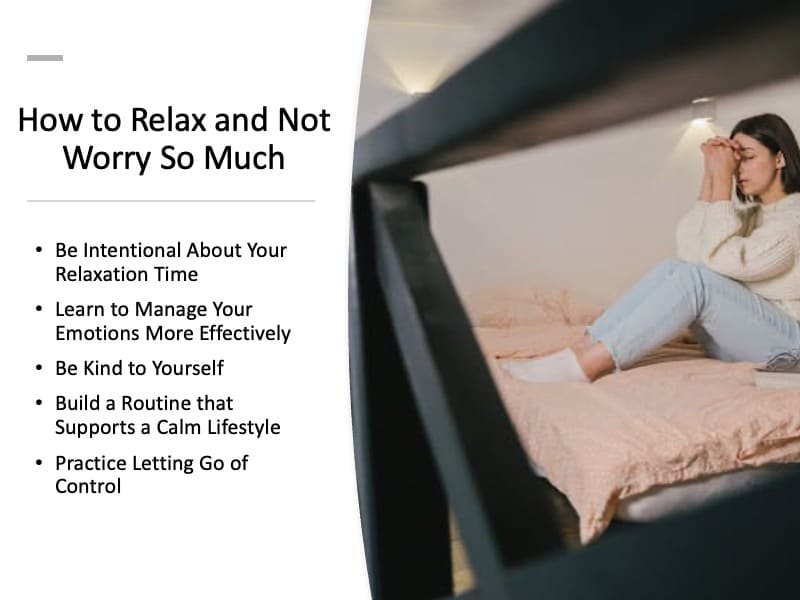How to Learn to Relax and Not Worry: Keys to Getting Started
Learning to relax and learning to not worry are essential skills for navigating the demands of modern life with clarity and resilience.
When you feel constantly overwhelmed, anxious, or stuck in cycles of overthinking, these practices offer a proven path toward emotional freedom and inner peace.
To learn to relax, you must create intentional moments of calm where your mind and body can reset.
Without these moments, stress accumulates and leads to physical exhaustion and mental burnout.
Equally important is learning not to worry and rewiring your thought patterns so that stress doesn’t dominate your focus or dictate your mood.
These strategies aren’t about escaping reality; they’re about changing how you relate to it.
Whether you’re just beginning your journey or looking to deepen your stress management toolkit, the following tips will help you learn to relax, worry less, and restore balance in your everyday life.
Understanding the Effects of Chronic Stress & Why You Need to Learn How to Relax
Chronic stress keeps the body in a prolonged state of “fight or flight,” constantly flooding the system with stress hormones like cortisol and adrenaline.
Over time, this negatively affects nearly every organ system.
Unlike acute stress, which is short-lived and can even enhance performance in small doses, chronic stress wears down the body over time
This highlights the importance of understanding the difference between acute vs chronic stress and addressing each appropriately.
Long-term stress impairs your ability to concentrate, contributes to inflammation, and disrupts hormonal balance.
Emotionally, it creates patterns of overthinking, self-criticism, and compulsive worry—none of which are easy to escape without conscious intervention.
Learning to not worry and relax doesn’t mean eliminating concern or responsibility.
It means developing tools to respond to stressors in a calm, focused, and constructive way.
How to Relax and Not Worry So Much

Relaxation and worry management are not innate talents—they’re learned skills that can be developed with consistent effort and self-awareness.
If you’re constantly overwhelmed or find yourself stuck in cycles of anxiety, it’s time to shift from survival mode to a state of intentional calm.
Learning to relax and learning to not worry begins with changing how you approach daily life, your inner dialogue, and your emotional responses to stress.
Be Intentional About Your Relaxation Time
The first step to learn to relax is recognizing that relaxation won’t happen accidentally. In the same way you schedule meetings or workouts, relaxation needs its own time slot on your calendar.
This could include 15 minutes of silent breathing each morning, an hour in nature after work, or simply carving out time to enjoy a hobby like chess, gardening, or reading.
Even simple games such as solitaire or sudoku can be excellent brain-calming tools when used with intention.
By treating relaxation like a priority—not an afterthought—you create space for healing, clarity, and emotional reset.
Learn to Manage Your Emotions More Effectively
Worry often stems from emotional dysregulation. When your nervous system is overstimulated, small stressors feel overwhelming.
The ability to regulate emotions is key to both resilience and relaxation.
Simple techniques like breathwork, journaling, and mindfulness meditation have been shown to reduce the physiological signs of stress and support emotional balance (Hölzel et al., 2011).
These strategies increase activity in the prefrontal cortex, which helps you pause before reacting and stay grounded under pressure.
Learning emotional regulation skills won’t happen overnight. However, even five minutes of daily practice can train your brain to respond instead of react.
Be Kind to Yourself
One of the most overlooked steps in learning not to worry is being kind to yourself and developing self-compassion.
When you harshly criticize yourself for mistakes or perceived failures, you activate the same stress response as if you were being judged by others.
Self-kindness means speaking to yourself with patience, grace, and encouragement.
Start by paying attention to your inner dialogue—especially in moments of stress. If your thoughts are overly critical, reframe them as if you were speaking to a close friend.
This shift doesn’t eliminate accountability. Instead, it fosters a safer internal environment that promotes growth and emotional relaxation.
Build a Routine that Supports a Calm Lifestyle

Relaxation isn’t a single event—it’s a lifestyle.
By integrating small, intentional habits throughout your day, you gradually reduce baseline stress and learn to stay relaxed even during challenging situations.
Some evidence-backed strategies include:
- Morning sunlight exposure to regulate cortisol and circadian rhythms.
- Regular movement, especially walking, mobility workouts, or low-intensity strength training.
- Limiting caffeine and stimulants, especially in the afternoon.
- Practicing gratitude journaling, which has been linked to improved mood and reduced rumination.
Consistency matters more than intensity. The more you practice these habits, the more your body and mind will associate daily life with calm instead of chaos.
Here are some of the best natural remedies for stress that you can build into your routine to help you worry less and relax more:
Prayer
Prayer is one of the most powerful and transformative ways to deal with stress.
Unlike secular mindfulness practices that emphasize self-emptying, Christian prayer allows you to cast your burdens on God, inviting peace through divine connection.
“Cast all your anxiety on Him because He cares for you.” (1 Peter 5:7, ESV)
Research shows that prayer regulates cortisol levels, engages the parasympathetic nervous system, and lowers blood pressure (Koenig, 2012; Levin, 2016).
Regular prayer has been shown to improve emotional resilience and promote feelings of safety, hope, and clarity.
To use prayer effectively for stress relief:
- Pray in private (Matthew 6:6)
- Use Scripture to ground your focus
- Practice gratitude in prayer to shift your mindset
- Pray throughout the day, even in short bursts like “God, I trust You”
- Pray the Lord’s Prayer for a complete and grounding reset
Prayer not only quiets the mind—it heals the heart and reminds us that we are never alone in our struggles.
Exercise
Exercise is a cornerstone of natural stress relief.
Whether through walking, lifting weights, or playing sports, physical movement helps regulate hormones, boost mood, and create a mental reset.
The ACSM’s Health & Fitness Journal confirms that nearly all types of exercise benefit stress management.
Regular workouts reduce cortisol levels and stimulate the release of endorphins—your body’s natural feel-good chemicals.
Low-intensity activities like walking, mobility workouts, or biking are especially useful because they lower stress without overstimulating your system.
Even intense workouts, while briefly increasing cortisol, ultimately train your body to recover faster and become more stress-resilient.
Strength training, for example, doesn’t just build muscle—it builds mental toughness.
Research shows strength training significantly reduces anxiety symptoms across various populations and improves mood regulation (Strickland & Smith, 2014).
Strength training improves:
- Cognitive function
- Self-efficacy
- Resilience to psychological stressors
- Confidence Self-Esteem
Exercise is a powerful tool for both physical transformation and emotional empowerment.
Consume a Stress-relieving Diet
What you eat plays a huge role in how you feel—mentally and physically. Making intentional dietary choices can dramatically influence how well you manage stress.
Fruits and vegetables are high in antioxidants, fiber, and micronutrients.
They reduce oxidative stress, improve gut health, and stabilize blood sugar, which promotes emotional stability and physical calm.
Found in fatty fish, flaxseeds, and chia seeds, omega-3s support brain health and reduce symptoms of depression and anxiety.
They also help dampen inflammation triggered by chronic stress.
On the other hand, high sugar intake causes blood sugar crashes that amplify irritability and emotional instability. Reducing processed sugars can reduce mood swings and emotional reactivity.
Caffeine increases heart rate and stimulates cortisol production.
While useful in moderation, high intake, especially under stress, can worsen anxiety.
Consider swapping coffee or energy drinks for green tea, which contains calming L-theanine.
Likewise, although you might believe alcohol provides temporary relief, it ultimately worsens stress by disrupting sleep, impairing emotional regulation, and increasing cortisol levels over time.
However, herbal teas offer a gentle and nourishing way to reduce stress levels and promote relaxation.
- Chamomile tea promotes sleep and calmness with apigenin, a natural sedative
- Lavender tea soothes the nervous system and helps manage anxiety
- Lemon balm tea enhances mood and supports better sleep
Use a Few Targetted Supplements for Stress Relief
Along with a well-balanced, micronutrient-rich diet, supplements can support your body’s stress response naturally and effectively.
A powerful adaptogen, ashwagandha lowers cortisol, improves focus, and boosts your body’s resilience to stress.
Holy basil supports adrenal function and emotional stability. It’s especially helpful for managing mental fatigue and mood swings under chronic stress.
B vitamins support brain function and nervous system health. A deficiency can worsen fatigue and anxiety.
Magnesium calms the nervous system, relieves muscle tension, and improves sleep. Qunol Magnesium Glycinate is highly absorbable and ideal for stress-related symptoms.
Your daily habits significantly influence your stress levels. The following lifestyle practices help reduce stress naturally:
Practice Letting Go of Control
Much of our worry stems from trying to control what we cannot. Learning to not worry involves recognizing the limits of your control and accepting uncertainty without spiraling.
Tools such as prayer, meditation, or simply reflecting on your personal values can anchor you during stressful moments.
Meditation activates the parasympathetic nervous system, which helps lower heart rate and blood pressure.
Just 10-20 minutes a day can create profound inner peace.
Writing out your thoughts or keeping a gratitude journal can reduce mental clutter and increase emotional regulation.
Handwriting is particularly effective for stress processing.
Trust that you are equipped to respond to challenges when they arise and that you don’t need to pre-live every possible negative outcome in your mind.
Letting go isn’t giving up—it’s choosing peace over panic.
Final Thoughts: How to Relax Your Mind

Learning to relax and not worry isn’t about avoiding life’s difficulties, t’s about building inner strength, emotional flexibility, and a more grounded perspective.
While stress is an inevitable part of life, how you respond to it can either drain your energy or deepen your resilience.
Through intentional practices like prayer, movement, nourishing nutrition, and supportive lifestyle changes, you can train your mind and body to remain calm even in the midst of chaos.
These strategies don’t just reduce stress, they help you create a life rooted in peace, clarity, and emotional well-being.
Remember, the journey toward relaxation and worry-free living isn’t about perfection, it’s about progress.
Every small step you take builds a more peaceful mind, a healthier body, and a spirit better equipped to handle whatever comes your way.



